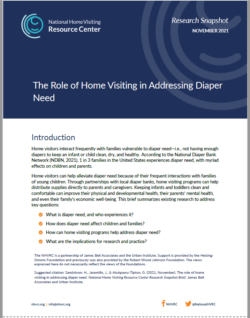
 Diapers are a basic necessity, yet diaper need—i.e., not having enough diapers to keep an infant or child clean, dry, and healthy—is a common problem that can impact children’s physical and developmental health, parent mental health, and family economic well-being. Evidence shows the issue cuts across family structures, parent education levels, and employment status. Few options exist for families who need financial assistance to obtain diapers, particularly among public benefit programs at the federal level.
Diapers are a basic necessity, yet diaper need—i.e., not having enough diapers to keep an infant or child clean, dry, and healthy—is a common problem that can impact children’s physical and developmental health, parent mental health, and family economic well-being. Evidence shows the issue cuts across family structures, parent education levels, and employment status. Few options exist for families who need financial assistance to obtain diapers, particularly among public benefit programs at the federal level.
Home visitors can help alleviate diaper need because of their frequent interactions with families of young children. They can identify and talk to parents about their concerns, and support families in accessing public benefits to offset other expenses. Home visiting programs can partner with local diaper banks to help distribute supplies directly to parents and caregivers. The American Rescue Plan Act provides a unique opportunity to receive funding to support local coordination.
This Research Snapshot Brief summarizes existing research to address key questions:
- What is diaper need, and who experiences it?
- How does diaper need affect children and families?
- How can home visiting programs help address diaper need?
- What are the implications for research and practice?
Read the full brief to discover four promising strategies to address this important issue and for a full list of references. As of press time, U.S. lawmakers had not decided whether to advance proposed legislation that would support diaper distribution to families. We believe this brief will be valuable to home visiting programs and staff, regardless of the outcome.
Suggested citation: Sandstrom, H., Jaramillo, J., & Atukpawu-Tipton, G. (2021, November). The role of home visiting in addressing diaper need. National Home Visiting Resource Center Research Snapshot Brief. James Bell Associates and Urban Institute.
Acknowledgments: Thank you to Allison Meisch, Joelle Ruben, and Jill Filene at James Bell Associates for their
support shaping and refining the brief.